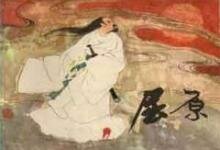Tragic or what?
The poet Qu Yuan, whose suicide is said to have been the origins of the Dumpling Festival, sure had a dramatic life.

Well, it’s the Dumpling Festival, also known as Duan Wu or the Dragon Boat Festival, again. O, how my heart leaps up when I behold, a bak chang on a string! For I love dumplings, with their humble lotus-leaf wrappings and rice-y, squat pyramidal forms and porky insides, bursting with goodness and nutritional fats. Yes, I love bak chang almost as much as I hate mooncakes, those terribly upstart, bourgeois, ecologically-disastrous, wannabe pastries. But I digress.
Today I am supposed to remind readers of the origins of the Dumpling Festival, because my editor has brought to my attention that it has its roots in the life – and death – of a poet, and that I am in charge of the poetry section of The Asia Mag. (No amount of explanation to my editor that poets – and thus by extension, people in charge of poems – do not actually work, will pacify her).
But I don’t mind, because the life of the doomed Qu Yuan is suitably tragic and sensational, as every true poet’s should be. Did Vincent Van Gogh cut off an ear? Did Camille Claudel go mad? Did Jimi Hendrix lose more and more of himself through drugs? None of these is a patch – if you’ll pardon the expression – on the life of Qu. (Of course, you can say that the story surrounding Qu is a legend, a mere myth that probably never took place. But when has poetry ever stopped at facts?)
Qu was born around 300 BC, which is quite a few years before Google launched Chrome. He was from the state of Chu and a descendant of the royal house during the Warring States Period of the Dynasty of Zhou, back in the day when where you came from, and whom you served, were more important than the car you drove. Qu served in high office and was what I suppose you would call a mandarin (by which I mean a scholarly bureaucrat, and not a dimpled orange).
The trouble really began for Qu when his king started being friendly with the state of Qin. Qu opposed the alliance, and was accused of treason and exiled from the kingdom. During his exile Qu wrote quite a lot of – you guessed it – poetry. (You can see a lovely sample of it in Asia Mag’s poetry archives here.) Twenty-eight years passed. One day, the state of Qin invaded the state of Chu and conquered its capital. In despair, Qu committed suicide by drowning himself in the Miluo River on the fifth day of the fifth lunar month.
You’d think that this is all quite dramatic enough, but the real action had yet to start. The local people, who apparently had grown to appreciate Qu, were so moved by his death that they threw lumps of rice into the river to feed the fish, so that they would not eat Qu’s body (fine lot of good that would do the already-dead poet, I say, but perhaps I’m more unsentimental than most.) The local people apparently also paddled up and down the river in boats, in order to scare the fish away and retrieve his body.
The lumps of rice are said to be the origins of dumplings (or bak chang in Hokkien, or zongzi in Mandarin). The paddling of boats is said to be where the tradition of dragon-boat racing comes from.
So there you have it. And even I, cynical though I may be, can see that, even if parts of this story may not actually have happened, it nevertheless contains some timeless truths. The truth that sometimes, if you stick to your guns, bad things can happen. The truth that often, speaking up to the powers-that-be is going to cost you.
The truth that, if you live a life on integrity, some – if perhaps not all – people will hold great respect you.
The truth that, if you’ve really put your heart and soul into something, thousands of years later, your voice and your art can still live on.
Happy Dumpling Festival.
Read a section of one of Qu Yuan’s ancient poems, The Lament.
Do you write poems? The Asia Mag welcomes original poetry. Send your submissions to [email protected].



 Clarissa is a journalist who focuses on travel and the arts. As a desperately hopeful author, she writes short stories and is working on a novel. Clarissa won the Spectator’s final Shiva Naipaul Memorial Prize for travel writing.
Clarissa is a journalist who focuses on travel and the arts. As a desperately hopeful author, she writes short stories and is working on a novel. Clarissa won the Spectator’s final Shiva Naipaul Memorial Prize for travel writing.













